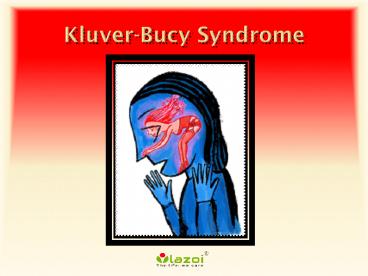Kluver-Bucy Syndrome: Very rare behavioural disorder - PowerPoint PPT Presentation
Title:
Kluver-Bucy Syndrome: Very rare behavioural disorder
Description:
Kluver-Bucy syndrome is a very rare cerebral neurological disorder associated with damage to both temporal lobes resulting in abnormalities in memory, social and sexual functioning and idiosyncratic behaviours. – PowerPoint PPT presentation
Number of Views:119
Title: Kluver-Bucy Syndrome: Very rare behavioural disorder
1
Kluver-Bucy Syndrome
2
Kluver-Bucy Syndrome
- Kluver-Bucy syndrome is a very rare cerebral
neurological disorder associated with damage to
both temporal lobes resulting in abnormalities in
memory, social and sexual functioning and
idiosyncratic behaviours. The syndrome affects
males and females equally.
3
What causes Kluver-Bucy syndrome?
- Kluver-Bucy syndrome in its complete adaptation
seldom occur in humans, however partial
infliction or presentation of this syndrome is
caused by massive bilateral temporal damage
attributable to herpes, degenerative disorders of
the human brain like Picks disease and
Alzheimers disease or cerebral-vascular diseases.
4
Symptoms
- Individuals with Kluver-Bucy syndrome display
the following behavioural manifestations - Acts of licking and touching that are
unacceptable for public display - Demonstrating excessive desire to engage in human
sexual practices (hypersexuality) - Engagement in binge-eating (excessive,
uncontrollable over eating) with feelings of
guilt and depression afterwards - People suffering from Kluver-Bucy syndrome tend
to be subjected to memory disorders consisting of
short-term memory loss and other serious
presentations of memory-related ailments - Inability to recognize people
- Lack of fear reaction
5
Symptoms
Continue
- Patients of Kluver-Bucy syndrome may also exhibit
presentations of flattened emotions (placidity)
like rare and extreme feelings of calmness and
undisturbed emotions - Having some extent of difficulty in
distinguishing and identifying some objects. - Disorders related to Kluver-Bucy
syndromeSymptoms of the following disorders can
be similar to those of Kluver-Bucy syndrome - Pick disease, or front temporal dementia, is a
very rare progressive neurological disease
initially predominately affecting the frontal and
temporal lobes of the brain. It is characterized
by progressive deterioration of intellect with
changes in behaviour and personality. The memory
is usually intact in the early stages of the
disease and there is less disorientation than in
Alzheimers disease.
6
Symptoms
Continue
- Alzheimers disease is a common progressive
disorder of the brain affecting memory, thought
and language. Groups of nerve endings in the
cortex of the brains of people with Alzheimers
degenerate and disrupt the passage of
electrochemical signals between the cells.
Affected individuals become increasingly
forgetful. As memory losses increase,
personality, mood and behaviour also tend to
change. - Korsakoffs syndrome is a deficiency of vitamin
B-1 that leads to cardiovascular, central and
peripheral nervous system disturbances. Early
symptoms of Korsakoffs syndrome include fatigue,
irritation, poor memory, difficulty sleeping,
chest pain, abdominal discomfort, poor appetite
and constipation. Later symptoms are principally
cardiovascular and neurological.
7
Treatments
- Treatment of Kluver-Bucy syndrome is supportive
and psychotropic that may be effective for some
of the associated symptoms.
8
CONNECT WITH US
- Logon to
- www.lazoi.com
- Like us on Facebook
- https//www.facebook.com/LazoiTheLife
- Follow us on Twitter
- https//www.twitter.com/lazoithelife
- Follow us on Pinterest
- https//www.in.pinterest.com/lazoithelife































